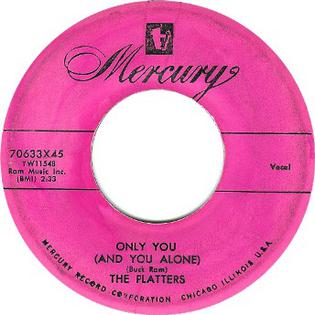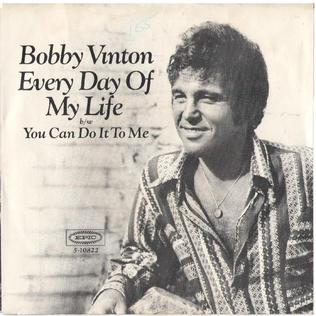Related Research Articles
"Mack the Knife" or "The Ballad of Mack the Knife" is a song composed by Kurt Weill with lyrics by Bertolt Brecht for their 1928 music drama The Threepenny Opera. The song sings about a knife-wielding criminal of the London underworld from the musical named Macheath, the "Mack the Knife" of the title.

"Only You (And You Alone)" (often shortened to "Only You") is a pop song composed by Buck Ram. It was originally recorded by The Platters with lead vocals by Tony Williams in 1955.

"The Great Pretender" is a popular song recorded by The Platters, with Tony Williams on lead vocals, and released as a single in November 1955. The words and music were written by Buck Ram, the Platters' manager and producer who was a successful songwriter before moving into producing and management. The song reached No. 1 on Billboard's Top 100, and No. 5 on the UK charts.
"Blue Moon" is a popular song written by Richard Rodgers and Lorenz Hart in 1934 that has become a standard ballad. Early recordings included those by Connee Boswell and by Al Bowlly in 1935. The song was a hit twice in 1949, with successful recordings in the U.S. by Billy Eckstine and Mel Tormé.

"He" is a song about God, written in 1954. The song made the popular music charts the following year.
"It's Almost Tomorrow" is a 1955 popular song with music by Gene Adkinson and lyrics by Wade Buff. The song was actually written in 1953, when Adkinson and Buff were in high school. Hit versions were released in 1955 by The Dream Weavers, Jo Stafford, David Carroll, and Snooky Lanson.
"Memories Are Made of This" is a popular song about nostalgia, written in 1955 by Terry Gilkyson, Richard Dehr, and Frank Miller. They were the members of a three-pieced group called "The Easy Riders", who served as a backing band for Dean Martin's version of this song, also released in 1955.
"Suddenly There's a Valley" is a popular song written by Chuck Meyer and Biff Jones and published in 1955.
"On the Street Where You Live" is a song with music by Frederick Loewe and lyrics by Alan Jay Lerner from the 1956 Broadway musical My Fair Lady. It is sung in the musical by the character Freddy Eynsford-Hill, who was portrayed by John Michael King in the original production. In the 1964 film version, it was sung by Bill Shirley, dubbing for actor Jeremy Brett.

"Why Do Fools Fall in Love" is a song by American rock and roll band Frankie Lymon & the Teenagers that was released on January 10, 1956. It reached No. 1 on the R&B chart, No. 6 on Billboard's Pop Singles chart, and No. 1 on the UK Singles Chart in July. Many renditions of the song by other artists have also been hit records in the U.S., including versions by the Diamonds, the Beach Boys, and Diana Ross.
"Young Love" is a popular song, written by Ric Cartey and Carole Joyner, and published in 1956. The original version was recorded by Ric Cartey with the Jiva-Tones on November 24, 1956. It was released in 1956 by Stars Records as catalog number 539 and one month later by RCA Records as catalog number 47-6751. Cartey's version never charted.
"Sweet Dreams" or "Sweet Dreams (of You)" is a country ballad, which was written by Don Gibson. Gibson originally recorded the song in 1955; his version hit the top ten of Billboard's country chart, but was eclipsed by the success of a competing version by Faron Young. In 1960, after Gibson had established himself as a country music superstar, he released a new version as a single. This version also charted in the top ten on the country chart and also crossed over to the Billboard Hot 100, where it peaked at number ninety-three. The song has become a country standard, with other notable versions by Patsy Cline and Emmylou Harris.

"I Forgot to Remember to Forget" is a 1955 rockabilly and country song, first recorded by Elvis Presley written by Stan Kesler and Charlie Feathers. It was Elvis' first no. 1 record nationally. The single was the fifth and final single released on Sun Records before Elvis moved to RCA Records.
"Eddie My Love" is a 1956 doo wop song. According to BMI and ASCAP, the song was written by Maxwell Davis (BMI), Aaron Collins, Jr. (ASCAP), and Sam Ling (BMI). Maxwell Davis played sax on the Teen Queens record. Aaron Collins was the brother of the Teen Queens. Sam Ling was an alias of Saul Bihari, co-founder of Modern, RPM, and other labels.
"Silver Threads and Golden Needles" is a country song written by Dick Reynolds and Jack Rhodes. It was first recorded by Wanda Jackson in 1956. The original lyrics, as performed by Jackson, contain a verse not usually included in later versions, which also often differed in other minor details.
"Standing on the Corner" is a popular song written by Frank Loesser and published in 1956. It was introduced by Shorty Long, Alan Gilbert, John Henson, and Roy Lazarus in the Broadway musical, The Most Happy Fella.

"Ev'ry Day of My Life" is a popular song written in 1954 by Al Jacobs and Jimmie Crane.

"Paralyzed" is a 1956 song recorded by Elvis Presley for his album Elvis. The song was recorded on September 1, 1956, and has been well received by music critics. The song was written by Otis Blackwell, with Elvis receiving partial song-writing credit.
"I've Got a New Heartache" is a song recorded by American country music artist Ray Price. It was released in November 1956 as the first single from his Greatest Hits compilation album. The song reached #2 on the Billboard Hot Country Singles chart.
References
- ↑ Whitburn, Joel (2004). The Billboard Book of Top 40 Hits: Eighth Edition. Record Research. p. 236.